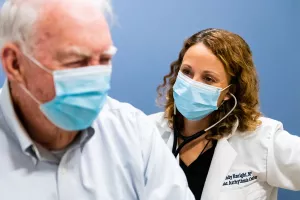We look after your heart and blood vessels and treat all kinds of cardiology conditions, including irregular heartbeat, heart failure and diseases you've had since you were born.
In rhythm with your heart and life
We understand that when it comes to cardiac care, you need a team of experts to create a customized treatment plan tailored to your needs. We work closely with vascular surgery, interventional cardiology, cardiac surgery and many other highly-specialized cardiovascular services to bring you cutting-edge treatments and new technology, like hybrid ORs and implantable cardiac devices. Our multidisciplinary approach ensures you receive the the best care available, so you can focus on what matters most: your health.
We have access to the latest clinical trials, exploring new and innovative ways to treat heart conditions like fixing holes in the heart and introducing new pacemaker technologies. You can count on us to provide you with the newest and most promising treatments available, as well as the emotional support you need to get through this.

Conditions
We take your heart health seriously and work closely with you and your family to create a personalized treatment plan that fits your needs. We understand that heart disease can be scary, but you don't need to worry because we're here to support you every step of the way. We provide complete care for:
Testing
The best treatment for heart conditions begins with a prompt and accurate diagnosis. It also means a better chance of survival with a lower risk of damage.
There are many types of tests for your doctor to find out what is happening to your heart. We have a wide range of cutting-edge diagnostic, interventional cardiology and cardiovascular imaging tools to give our doctors specific technology to pinpoint troubles in the heart and find the best way to treat them. That's why we offer accessible diagnostic testing and evaluation, including:
- Ambulatory heart monitoring
- Cardiac catheterization
- Cardiac CT scan
- Cardiac event monitor
- Cardioversion
- Diagnostic cardiac catheterization
- Echocardiogram
- Electrocardiogram
- Electrophysiology
- Exercise stress test
- Heart CT calcium scoring program (calcium scoring)
- Holter monitor
- Interventional cardiology, percutaneous coronary interventions
- Loop recorders
- Nuclear stress test
- Tilt table test
Treatments
We understand how important your heart is to you, and we want to be there to support you every step of the way. Whether you're dealing with a sudden or ongoing heart problem, or just need some help managing your symptoms, we're here to offer you a helping hand. We work with you to create a personalized care plan that meets your unique needs. From innovative treatments to comprehensive services, we're here to provide you with the care you deserve, which may include:
- Aneurysm repair
- Angioplasty
- Bypass surgery
- Cardiac surgery
- Cardioversion
- Cath lab interventions
- Clinical trials
- Congenital cardiothoracic surgery
- Electrophysiology (EP) ablation
- Electrophysiology services
- Emergency treatment
- Heart transplant
- Heart valve replacement
- Hypertrophic cardiomyopathy
- Implantable devices (heart pump, pacemaker, implantable cardioverter-defibrillator)
- Interventional cardiology
- Interventional radiology
- Medication management
- Minimally invasive procedures and surgery
- Stent placement
- Transcatheter aortic valve replacement program (TVAR)
- Vascular care
- Vascular surgery

From regular office visits to inpatient stays, find the healthcare you need and deserve close to home.

Meet the doctors and care team devoted to supporting you every step of the way along your path to better health.